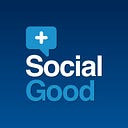World Health +SocialGood Day 1 Recap
70 years of WHO global health guardianship and a look to the future of universal health care.
By Annie Rosenthal
The World Health Assembly (WHA) is the supreme decision-making body of the World Health Organization. Held annually in Geneva, Switzerland, WHA is attended by delegations from all 194 World Health Organization (WHO) Member States.
During the World Health Assembly, member states and global health experts meet to set the agenda for the next year of work. This year, WHO’s 70th anniversary, Member States will vote on the Director-General’s General Programme of Work that will guide the organization through 2023. Learn more about the 71st World Health Assembly here.
A conversation this important needs to include everyone. That is why the World Health Organization has partnered with the United Nations Foundation to produce World Health +SocialGood, a daily 30-minute program that connects the global community to experts at the assembly in Geneva. So far, viewers from Nepal to Sudan to Peru and beyond have engaged in the conversation. Check out our highlights from the program so far below and tune-in May 23 and 24 at 10am ET for further conversations!
Day 1: Bringing Health to All: Universal Health Coverage and Celebrating 70 Years of WHO
Day 1 of the World Health +SocialGood program celebrated the past 70 years of WHO’s work while also looking at how further work can help us to achieve universal health coverage. Here are three things we learned:
1. The World Health Organization served for 70 years as the world’s guardian of global health. From eradicating small pox to dramatically reducing child mortality, WHO has helped lead global movements to improve health worldwide. Their ability to coordinate multi-laterally and across national borders allows them to bring unique value in the against disease.
2. Countries are working with WHO to help ensure a future of universal health care, but more must be done. Experts such as Dr. James Fitzgerald stated ways that we can promote future health care access, including the four critical elements of universal health care:
- Political commitment to expand comprehensive health services
- An increase in financing
- Strengthening government stewardship of the health sector
- Addressing the social determinant of health.
He also cited important programmatic successes, such as Brazil’s most recent program of reaching rural populations, which has reached and ensured health care access to more than 60 million people.
3. Frontline health workers are essential to global health progress. The program ended with an interview with Luca Urbani, son of Dr. Carlo Urbani, who was honored at the World Health Assembly for his sacrifice in the work against SARS. Luca stated that his father “wasn’t doing his work for money or fame, he was helping others because it was the only thing he wanted.” Around the world, workers have dedicated and given their lives to making our world healthier. We must invest in better support to protect and honor the work of these heroes.
Day 2 of World Health +SocialGood explored how we can promote a healthier world. Check out our summary of the conversation here.
